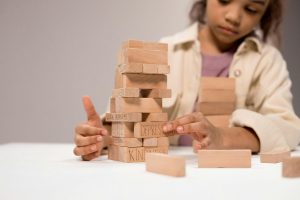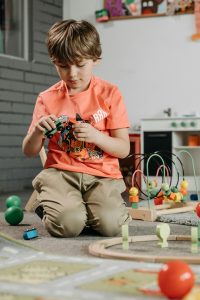LEARN SOMETHING NEW
Therapy Blog for Orem, Spanish Fork & South Jordan
Exploring Play Therapy for Children
Among therapeutic techniques, play therapy proves highly effective, particularly with children. By tapping into the natural language of play, this approach enables children. They learn how to communicate, explore, and resolve their emotions in ways that traditional talk therapy may not fully achieve. Toys become their words and play becomes their sentences (Related Article: Exploring Sand Tray Therapy for Children and Teens). 
Understanding Play Therapy
Play therapy utilizes play as a therapeutic tool for children to express themselves and work through challenges. Through toys, games, and creative activities, children can externalize their thoughts, feelings, and experiences in a safe and supportive environment. This method helps them process complex emotions, develop coping skills, and build resilience.
A significant strength of play with children in therapy lies in its ability to go beyond verbal limitations. Children often struggle to articulate their emotions and experiences through words alone. Play therapy provides a non-judgmental space. Children communicate symbolically and metaphorically, using toys and activities to represent their feelings and make sense of their lives.
Tailoring Therapy to Individual Needs
Another strength of play in counseling is its flexibility and ability to be tailored to meet each child’s unique needs and developmental stage. Therapists can adapt play techniques and materials based on the child’s interests, personality, and therapeutic goals. Whether engaging in imaginative play, artistic expression, or sensory activities, the therapeutic process is personalized to address specific concerns and promote healing.
Rooted in the understanding that play is a child’s natural language of self-expression, play therapy is tailored to meet each child’s developmental needs. Children can engage in imaginative play, storytelling, or using art materials. By doing this they can externalize their inner worlds. This makes it easier for therapists to understand their challenges and guide them toward healing.
By customizing therapy sessions focused on play, therapists can effectively address a wide range of issues including anxiety, trauma, grief, behavioral problems, and adjustment difficulties (Related Articles: Child Therapy and How To Offer Extra Support To Your Child in ADHD Therapy). This personalized approach ensures that children feel empowered and supported in their therapeutic journey, fostering positive outcomes and promoting emotional well-being.
Creating a Safe and Supportive Environment
Effective therapy hinges on creating a safe and supportive environment where clients feel validated and understood. Play therapy inherently fosters such an environment by allowing children to play freely without fear of judgment or criticism. This freedom promotes trust and rapport between the therapist and the child, essential for productive therapeutic work.
In this secure setting, young clients can explore and work through a range of issues, including anxiety, trauma, behavioral challenges, and social difficulties. Play in counseling encourages emotional regulation, problem-solving skills. It also promotes empathy development, equipping children with valuable tools for navigating their lives (Related Articles: Parenting: How To Help Your Child Process Big Feelings and John Gottman’s Work)
Integration of Play Therapy
Therapeutic play offers a powerful framework for children to engage in therapeutic exploration and healing. I integrating play into my practice as an Experiential and Attachment-Based therapist. I support children in developing a deeper understanding of themselves and their relationships. Play becomes a pathway for healing, growth, and empowerment, guiding young clients toward a more confident and fulfilling future.
